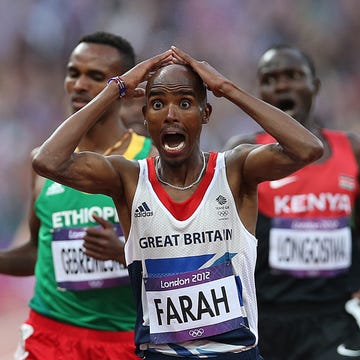Renowned Brazilian marathoner Vanderlei Cordeiro de Lima, 46, appeared late in the opening ceremony of the Olympic Games Friday night in Rio. He took the Olympic torch and ran it up a steep flight of several dozen steps to light the Olympic cauldron that burns inside Rio’s Maracanã Stadium, completing the flame’s long journey from the site of the ancient Olympics in Olympia, Greece, to Brazil.
De Lima cannot be considered the finest marathon runner in Brazilian history. That accolade goes to Rolando da Costa, who in 1998 ran a 2:06:05 world record in Berlin. But de Lima has done more to bring honor to his nation and to his sport.
De Lima’s selection for the high honor of lighting the cauldron is due to his performance 12 years ago in Athens, Greece, when he ran to a bronze medal finish in the marathon. Although he wasn’t a medal favorite, he was well known going into the 2004 Games. He had finished runner-up at the 1998 Tokyo Marathon in 2:08:31 and a few months before Athens had won the Hamburg Marathon in 2:09:30.
At the Olympic marathon, few onlookers expected to see de Lima assume the lead at the 20K mark and remain in front for close to an hour. Far more surprising, however, was what happened when de Lima reached the 36-kilometer mark with a 25-second lead.
Suddenly a man ran out into the road from de Lima’s left side and shoved him into a group of spectators lining the course. The attacker, who wore a placard with the message, “The second coming is near,” was quickly pulled off de Lima, who resumed his race after losing 10 to 15 seconds. (The replay, 45 seconds into the clip below, gives a clear view of the attack.)
De Lima was clearly rattled by the violent episode. Stefano Baldini of Italy, the eventual winner in 2:10:55, soon overtook him, as did American Meb Keflezighi, Health - Injuries.
But the Brazilian gathered his composure after being passed, maintaining third place through to the finish. Once into the final 400 meters of the race, a lap of the Panathenaic Stadium track, de Lima could no longer contain his joy. With a big grin on his face and arms outstretched he began weaving along the track’s home straight, blowing kisses to an appreciative crowd who had watched the earlier incident on the stadium’s big screen. De Lima crossed the line in 2:12:11, the bronze medal his to bring home to Brazil.
At the closing ceremony in Athens, de Lima was awarded the rarely given Pierre de Coubertin Medal, an honor named after the Frenchman considered the father of the modern Olympic Games. Within a few hours of the marathon finish an IOC spokesman remarked, “We decided to do this in recognition of de Lima’s exceptional demonstration of fair play and Olympic values during this evening’s marathon.”













